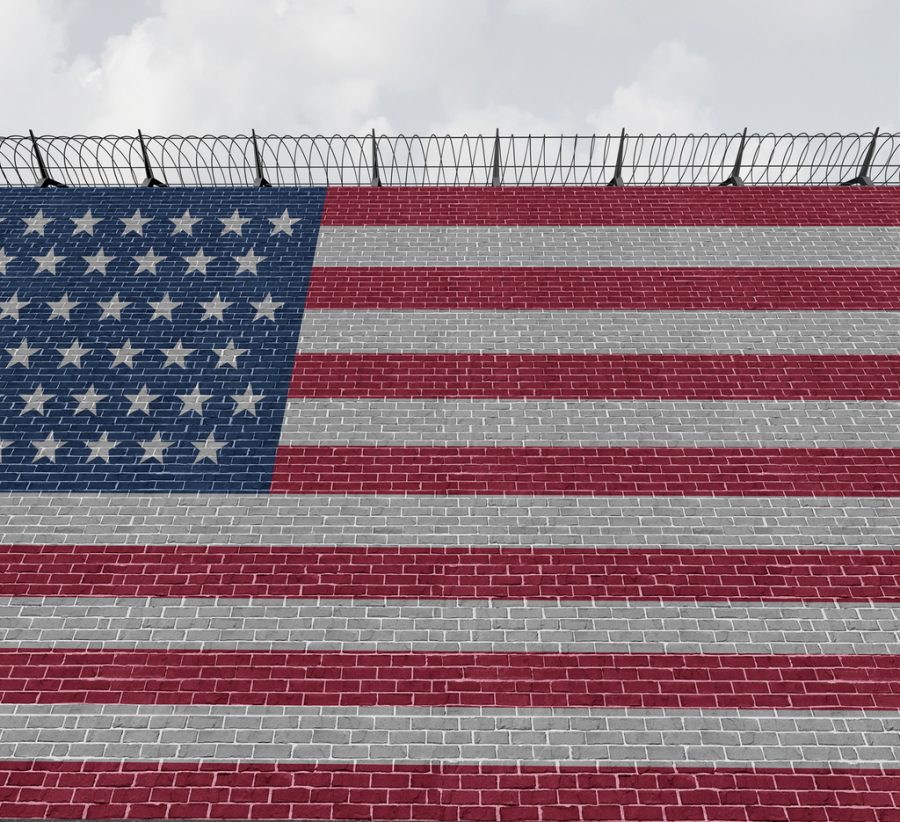A Major Stock Market Crash Brews as Trump “Makes America Vulnerable Again”
Europe could trigger a catastrophic stock market crash. The old continent has a few months, if not weeks, to save a key aspect of its unification project: open borders between member states.
Americans may not appreciate the significance. That’s understandable; why should they care? Yet, they should care.
As significant as Europe’s problems might be, they are masking the fact that the entire U.S.-dominated global financial system can no longer cope. Europe could simply be the trigger for a stock market crash with deep roots.
The next stock market crash, meanwhile, won’t simply affect investors. It will have a deep impact on the U.S. economy itself, starting from the strength of the dollar and the United States’ ability to run a trade deficit.
The European Union may implode, terminating a 75-year-old idealistic political experiment. But thanks to President Donald Trump’s protectionist trade policies, this failure will expose the limits of the U.S. system itself.
Next Stock Market Crash Will Change the U.S.-Dominated Global Order
The coming stock market crash will be such as to bring into question, for the first time, the United States’ post-World War II economic dominance.
No longer will the U.S. dollar serve as the world’s reserve currency. This will severely limit the United States’ ability to issue debt—in the form of Treasuries—to foreign governments.
Without the ability to sell debt (which, in practice, implies the ability to print more dollars), America’s fiscal and military systems cannot carry on as usual.
The Trump tax cuts for corporations and wealthy individuals—and the exorbitant Pentagon procurement contracts—will prove to be dangerously unsustainable.
America Has Already Boarded the Ship to Financial Disaster
Trump has launched a trade war. And the markets have only just started to feel its effects. The Dow Jones Industrial Average has started its descent. This trade war will result in a stock market crash. The only question concerns the speed of that crash.
Will it be a sudden jolt with a 40%-50% loss in a matter of a few days, as in October 1929 or September 2008? Or will it be a protracted drop?
The second option seems more likely. Indeed, it has already begun.
There’s no need to resort to fancy opinions and logic. Any market observer, even a casual one, will have noticed that, since the Dow Jones hit 26,600 points in January 2018, it has not been able to replicate that success.
One can always expect the Dow to recover. After all, hope is always the last to die.
At present, America might be compared to a surfer trying to ride between two dangerous waves, blind to the threats that lurk beneath.
The first wave represents the recent past. It’s the one resulting from foolish military and political interventions that have contributed to the reduction of American influence worldwide. At best, others fear the United States now.
President George W. Bush—and in some ways his predecessors, Bill Clinton and George H.W. Bush—squandered whatever prestige (and respect) the U.S. gained after World War II.
President Barack Obama inherited a geopolitical mess. But despite early good intentions, Obama made it much worse.
The second wave, simply put, is Trump and what his voters expect.
Many Voted for Trump, But What Did They Get in Return?
Many Americans voted for Trump to stop the negative momentum that had gathered strength for decades.
Certainly, most people didn’t really care about the military campaigns. What they cared about was the fact that all those wars brought benefits to an ever richer, but smaller, bipartisan elite, who seemed to care less about the issues affecting ordinary Americans.
All the while, the stock market continued to exercise its power. In the 1990s, after the collapse of communism, there was no social or political ideology to compete with capitalism.
Pro-market ideas gained unchallenged and unparalleled supremacy. So much so that the traditional Left parties in western countries—from the U.K., to France, to the United States—became enthusiastic champions of market solutions for every socioeconomic problem under the sun.
The Left, meanwhile, feeling the burn of its philosophical defeat and lost without a point of reference such as the Soviet Union, became like Moses wondering the desert. But Moses found God and a guide.
The Left is still looking, and the search has led it to strange places.
Nevertheless, Right or Left, those willing to open their eyes will notice the huge walls that are preventing the true, widespread, “rising tide lifts all boats” variety of economic growth.
No Difference Between Wall Street and Las Vegas
The stock market has become more of a Las Vegas casino. Look no further than Tesla Inc (NASDAQ:TSLA) stock to realize just how irrationally optimistic many investors have become.
But the irrational behavior–or “exuberance,” as former Fed Chair Allan Greenspan described it–goes beyond Tesla. It has been driving the entire post-tax-cut rally that produced the Dow’s record highs in January 2018.
The exuberance has managed to place the wool over Americans’ eyes during the past few decades.
Trump, for better or worse, has exposed the hypocrisy. He averts military intervention against North Korea, yet the Democrats and the liberal media demonize him for it.
On the flip side, Trump promised prosperity (“making America great again”), yet he started a trade war with China and the European Union, which will only exacerbate the unsustainable income inequality that plagues the U.S. (and the West in general).
Nationalism is No Solution to Economic Problems
The market has spoken: investors don’t like trade wars. Right or wrong, stock valuations are dropping and eventually the economy will enter a recession. Meanwhile, the White House will have fewer tools at its disposal to reverse it.
Perhaps Trump can launch another military war; Iran comes to mind. As others before him, the president can always use nationalism to distract Americans away from their economy.
That’s hardly a solution, though. And it’s hardly what made voters cross his name on the ballot.
Certainly, Trump’s “self-reliant” economic strategy can only go so far. It can work so long as foreign governments keep buying the U.S. dollar and U.S. Treasuries.
In a world that is suddenly finding itself encouraged to raise trade barriers, having the strongest currency helps. Everyone needs it and wants it for security.
If the dollar retains its value, the U.S. can keep borrowing against it to pay for its military and other government services. But what if the dollar loses the universal currency role it has enjoyed since the end of the gold standard in 1971?
Economic and political insecurity around the world have typically helped the United States. The more chaos, the higher the “gravitational pull” of the dollar.
But how long can this show last? The evidence suggests that the end is near and that America will no longer have its way.
No More Dollar-Backed Trade Deficit
Apart from the brewing rebellion against the dollar-based status quo at the global level, America must face significant enemies at home.
These enemies are not foreign terrorists or dictators. They are homegrown economic policies that should have been fixed decades ago. Now it may be too late, and the next stock market crash will be all the worse for it.
Some media have been eager to report the alleged U.S. economic growth in gross domestic product (GDP) terms. Well, GDP has grown at a rate between 2.2% and 2.3%. (Source: “US economy’s growth revised lower as consumer spending slows,” Business Insider, May 30, 2018.)
Unemployment has also dropped to a level not seen in ages. More Americans have jobs than they did 18 years ago. But there’s a hidden cost; alongside the high employment (or low unemployment, if you prefer) is stagnant wage growth and high inequality. The gap between rich and poor has widened. This fuels instability and resentment.
All the revolts in the Arab world that many idealists prematurely described as a “spring” had nothing to do with democracy. Most people revolt because of their stomachs. And America is not immune to its own “spring.”
Trade Wars Have Consequences
Trump’s trade wars have already had their little effects.
The president may not realize that most countries don’t rely on the U.S. as an import market any longer. Except for huge-ticket items such as airliners and large weapon systems, what’s left of U.S. production mostly feeds domestic demand.
Now, Europeans and others have started to retaliate against Trump’s tariffs. One of these “others” is the American company Harley-Davidson Inc (NYSE:HOG).
As one of the few American-made goods able to challenge the toughest world competition abroad, Harley Davidson motorcycles were slapped with 10% retaliatory tariffs by the European Union.
The company’s response is a plan to move production away from the U.S. to avoid the tariffs. On June 22, the stock sank. (Source: “Harley Davidson moving production overseas,” CNBC, June 25, 2018.)
The Harley-Davidson situation is a small-scale example of what the Trump trade wars will bring. The trade disputes will translate directly to stock market losses, as well as job market ones.
Meanwhile, the Trump tax cuts did not help businesses grow, as much as they contributed to major corporations performing stock buybacks. This has helped keep stock valuations inflated.
The combination of vulnerabilities—geopolitical, domestic, economic, and financial—have started to come together.
A major storm is brewing, which can only end with what could be the biggest stock market crash in modern history.






